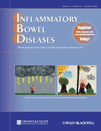Initial clinical experience with allopurinol-thiopurine combination therapy in pediatric inflammatory bowel disease
Abstract
Background: Thiopurines are a mainstay of immunomodulator therapy in inflammatory bowel disease (IBD). Despite their efficacy, some patients may have a poor response due to inability to achieve adequate levels of the active metabolite, 6-thioguanine (6-TGN). Others experience hepatotoxicity, which correlates with excessive 6-methylmercaptopurine (6-MMP) levels. Two adult studies have demonstrated successful manipulation of thiopurine metabolism with allopurinol, a xanthine oxidase inhibitor, to achieve more optimal thiopurine levels. The aim was to retrospectively characterize the utility of allopurinol to optimize thiopurine metabolite levels in pediatric IBD patients.
Methods: Thirteen patients received allopurinol daily (100 mg in patients ≥30 kg and 50 mg <30 kg), and their thiopurine dose was simultaneously reduced to 25%–50% of the previous maintenance dose. Metabolite levels and other screening labs were checked 2–4 weeks later.
Results: The mean azathioprine dose was decreased from 148.1 to 59.6 mg daily (60% of the mean original dose). The mean 6-TGN level increased from 173 to 303 pmol/8 × 108 red blood cell count (RBC) (P = 0.03), and the mean 6-MMP level decreased from 7888 to 2315 pmol/8 × 108 RBC (P < 0.001). Elevated transaminase levels improved or resolved in all patients. Two patients experienced reversible neutropenia. At the conclusion of the study 9 patients (69%) remained on combination therapy with a mean duration of follow-up of 162.8 ± 119.2 days.
Conclusions: Combination therapy successfully shunted thiopurine metabolites to a more favorable pattern. Reversible neutropenia was the most common side effect (2 patients). Long-term prospective studies are needed in this patient population.
(Inflamm Bowel Dis 2008)




